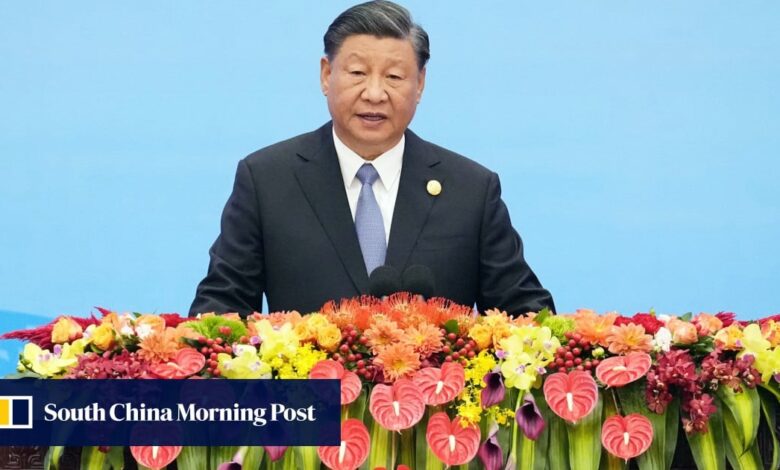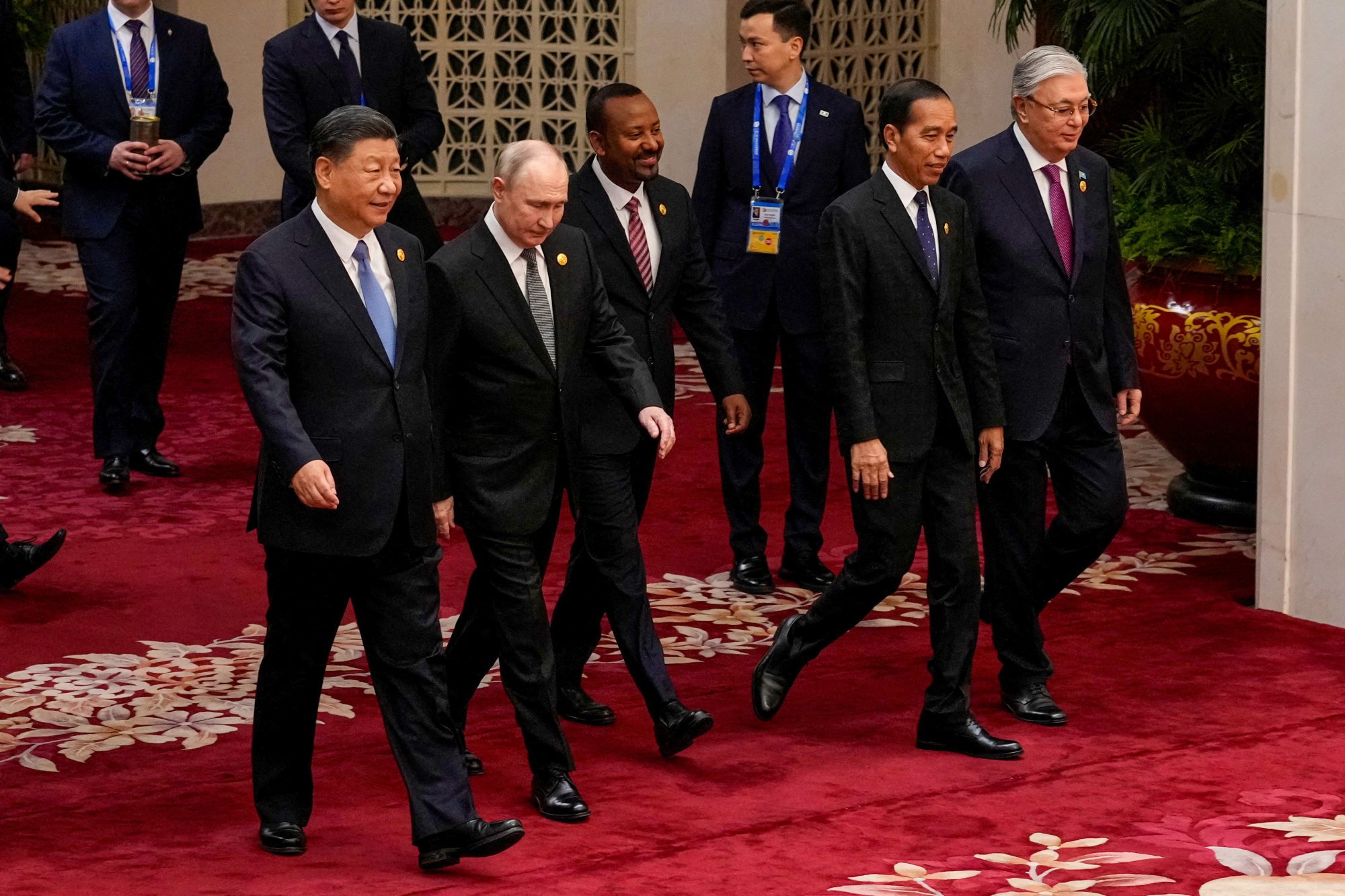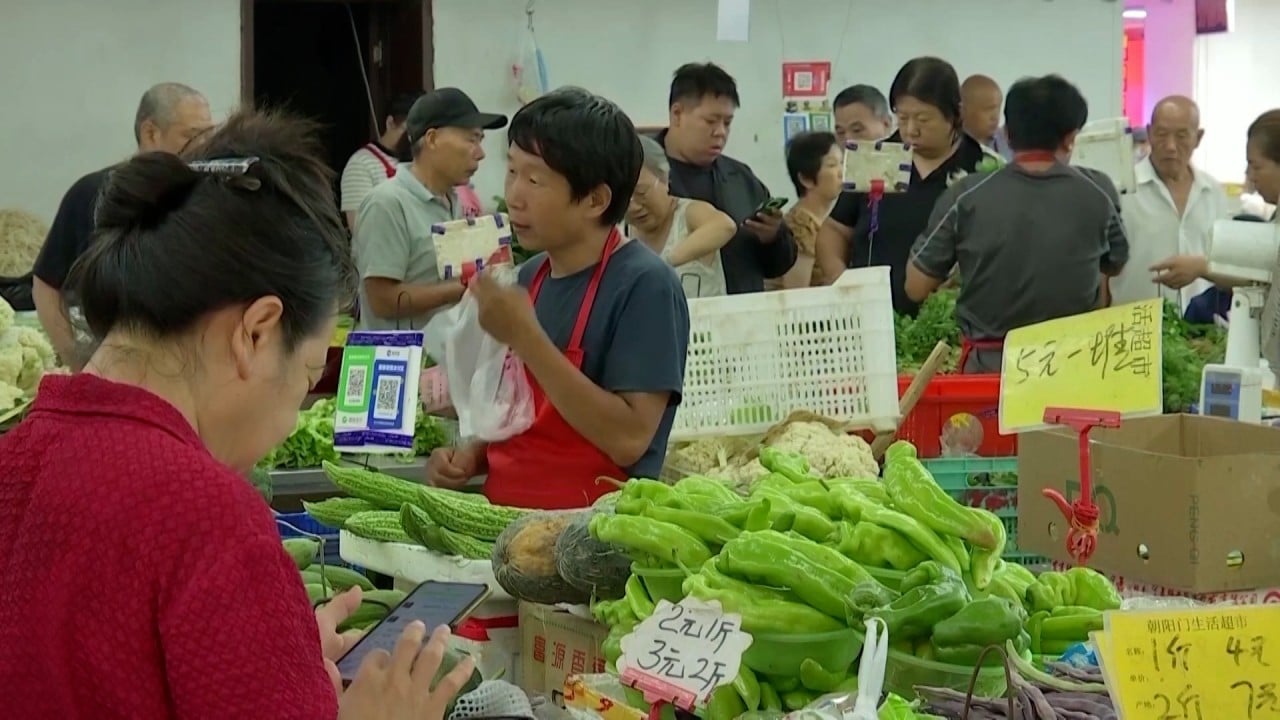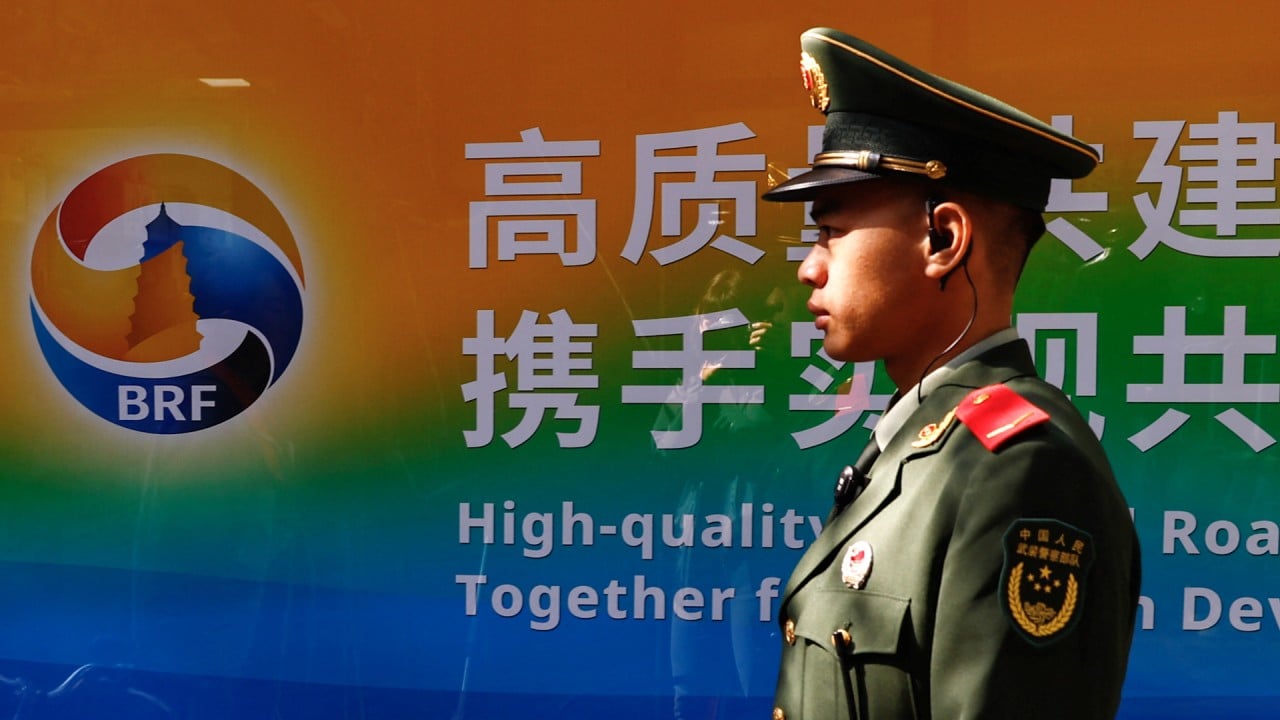Belt and road forum: Xi Jinping signals China will stay the course in development pitch to Global South

This headline figure of 780 billion yuan is the same sum pledged at the first belt and road forum in 2017, when Xi promised to pump 100 billion yuan into the Silk Road Fund; offered 380 billion yuan in loans from the same two policy banks and counted on financial institutions to raise the remaining 300 billion yuan.
However, this time there was a greater emphasis on what Xi described as “small but beautiful” projects and green development, compared with the grand projects of previous years.
However, Beijing has said concerns about its economic prospects are exaggerated and shortly before Xi began speaking, China announced better than-expected GDP figures for the third quarter, suggesting it was on track to meet its annual growth target of 5 per cent.
Xi stressed the importance of “strategic focus and resolution” in times of “great uncertainties and changes” in his speech.
“As the saying goes, the one who gives roses to others will have the fragrance lingering on their hands,” he continued. “Viewing others’ development as a threat or taking economic interdependence as a risk will not improve one’s own life or speed up one’s development.”
Zhao Xijun, a finance professor at Renmin University in Beijing, said the speech shows the Belt and Road Initiative “remains China’s key enabler of globalisation amid the tide of anti-globalisation in the West”.
Chinese leader starts belt and road charm offensive
Chinese leader starts belt and road charm offensive
The US and other Group of Seven countries have tried to counter the project by launching their own alternative – the US$600 billion Partnership for Global Infrastructure and Investment – which they said aims to “develop a values-driven, high-impact, and transparent infrastructure” in low- and middle-income countries.
But Zhao said the belt and road offers “a concept, action plan and resources” that will allow countries to choose different paths of development.
China’s Foreign Minister Wang Yi said that the country was willing to work with other development projects, including the Partnership for Global Infrastructure and Investment, but said economic issues should not be “politicised”.
“We may as well compete internationally who can build more roads, railways and bridges for developing countries, and who can build more schools, hospitals and gymnasiums for the people in low-income countries,” he told a press conference. “We are confident.”
Wang also said “far more” had been delivered at this year’s forum than at the previous one, which was held in 2019, adding that the “most ambitious vision” outlined this year was joining with other countries to modernise the world. He also said the event sent a clear signal of support for openness and cooperation in the face of the “cold war mentality and bloc confrontation”.
But he was given a red-carpet reception in Beijing, which is not a signatory to the court.
In his speech, Xi did not explicitly mention the wars in Ukraine and Gaza – or US tech and investment curbs on China – but said: “We stand against unilateral sanctions, economic coercion, and decoupling and supply-chain disruptions.
“Ideological confrontation, geopolitical rivalry, and bloc politics are not a choice for us,” he added, in a veiled rebuke of America’s policy toward China in recent years.
The Chinese leader unveiled an eight-point action plan that included a focus on financing “small and beautiful” projects to improve livelihoods in developing countries.
He also promised that China will support an open world economy, boost the trade in goods and services, promote the digital economy and remove all restrictions on foreign investment access in the manufacturing sector.
There were commitments to promoting green development, a network of experts in and a solar panel industry dialogue. All of these align with China’s aim of expanding the market for its new energy products in developing markets following US sanctions on its solar panels and the European Union investigation into electric car subsidies.
There were also a series of pledges to further improve transport and logistics links across Eurasia – commitments echoed by Putin in his speech.
Belt and road forum ‘a showcase’ for China’s growing global influence
Belt and road forum ‘a showcase’ for China’s growing global influence
Xi’s commitments included speeding up the development of the China-Europe rail link, integrating ports, shipping and trading services under the Maritime Silk Road, and the“faster development of the New International Land-Sea Trade Corridor and the Air Silk Road”.
Meanwhile, Putin said the Belt and Road Initiative was “truly a global plan” and said he would work to better integrate projects under the Russian-backed Eurasian Economic Union with the scheme. He also outlined plans to develop transport links from the Arctic to the south and invited interested countries to help develop his planned Northern Sea Route across the polar regions.
Andrew Korybko, a Moscow-based political analyst, said: “Putin used the global attention afforded to this year’s forum to raise maximum awareness of Russia’s investment potential in the Arctic region, though his desire to court foreign investment there isn’t anything new.
“Putin importantly drew attention to his country’s Eurasian connectivity potential through the Northern Sea Route and North-South Transport Corridor projects, which dispels the notion that China and the West are the only main infrastructure players in the world nowadays.”
Xu Qinduo, a political analyst at the Chinese public policy think-tank Pangoal Institution, said there was “strong global interest” in the Belt and Road Initiative.

“Beijing’s openness to cooperation and rejection of bloc politics are likely to serve its own national interests – countries feel more comfortable working with China,” Xu said. “As Washington focuses on its own re-industrialisation and increasingly turns to protectionism, while also providing support to both Ukraine and Israel, it’s unlikely that it can match the size of China’s investment in the Global South.”
Barry Sautman, an emeritus professor at the Hong Kong University of Science and Technology, said: “Chinese analysts hold that their country’s progress depends on the development of the world economy, especially of the developing countries.
“That means that China will seek to spur development in countries with a wide variety of political systems and international positions. What the funding announcement amounts to is China putting its money where its mouth is.”
He said the main obstacles the project faces in some parts of the world come from domestic politics, citing “certain political forces in Central Asia” that are suspicious of China and the pro-Western leanings of many in Central Europe.
“These forces are not necessarily in power, but are influential. China will have to find a way to placate or at least neutralise their influence in bilateral and regional relations,” said Sautman.
Additional reporting by Orange Wang and Mandy Zuo







